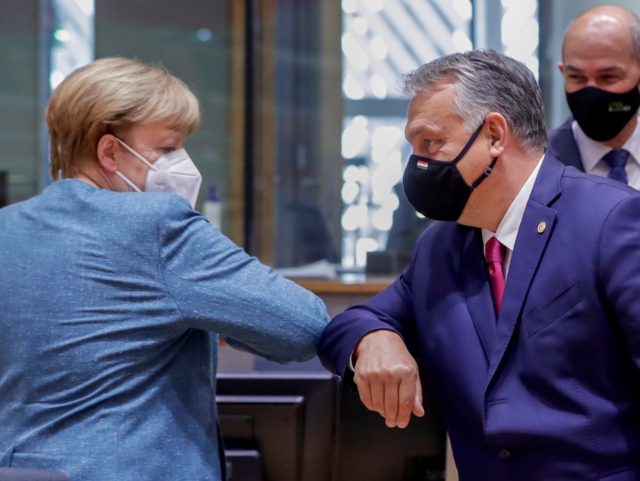Hungarian Prime Minister Viktor Orbán is sticking to his guns over his power to veto the EU’s entire seven-year budget over a new ‘rule of law’ condition that would leave the door open for Brussels to blackmail conservative countries like Hungary and Poland.
Hungary and Poland sensationally blocked the European Union’s budget using their veto powers last month after a long-term political disagreement came to a head, namely whether the cash Brussels distributes to member states in the name of ‘solidarity’ should go to those who need it most, or be restricted to those members that do as EU leaders command.
This new condition of receiving money — or rather, the ability for Brussels to stop handing it out in response to claimed infractions — came as a particular concern to Poland and Hungary as they have clashed with the EU’s liberal mainstream on mass migration and open borders for months. Because the new condition had been written into the forthcoming seven-year budget and coronavirus recovery package against their protests, the only options remaining to Budapest and Warsaw, they claimed, was either to accept that Brussels could blackmail them into accepting political diktats from the centre in perpetuity, or use the nuclear option of vetoing the whole budget in one.
'Enslavement': Hungary and Poland Veto Globalist EU Budget https://t.co/guMjYeRGn6
— Breitbart London (@BreitbartLondon) November 17, 2020
As Germany’s Deutsche Welle reports, nearly three weeks later the Hungarians have not shifted, and remain committed to keeping the new budgetary requirements out. Hungary Today reports Orbán’s comments to Hungarian national radio on Friday morning, where the prime minister was specific about his concerns on allowing what he called the “so-called rule of law tool” to be enacted.
Prime Minister Orbán said: “They want to be able to shoot down Hungary and Poland’s opposition to migration with a simple majority vote. That’s what this is all about, that’s what the so-called rule of law tool would be used for.”
Addressing the rumours that Hungary would compromise if the EU inserted a more explicit clause about when and where the rule of law tool could be used, he was bullish and said that “adding some declaration… won’t cut it. Hungary is adamant that the two issues should be separated.”
The Hungarian leader also dismissed the idea that the nation’s ally in this matter, Poland, would fold and leave him isolated. Mr Orbán pointed out that Hungary and Poland had already signed an agreement of mutual support and would back each other up.
The European Union’s own internal democratic system gives every member state — from the largest and richest to the smallest and humblest — a veto power that was intended to prevent a majority of powerful states bullying or railroading the others. In this way, it provided a particularly important reassurance to the smaller post-communist and Balkan states that have joined the bloc in recent decades that they could apply the handbrake on key issues when needed without fear of being overruled by the small club of wealthy, northern European states that pay the lion’s share of the EU budget and, generally, set the tone of proceedings.
Hungary: EU is Trying to Punish Countries That Control Their Own Borders https://t.co/eavzHKu18A
— Breitbart London (@BreitbartLondon) November 18, 2020
Yet despite this, the EU is already looking at ways to move ahead with the budget, side-stepping Hungary and Poland as they do — potentially making a mockery of the bloc’s own safeguards. Britain’s aggressively-pro European Union newspaper the Financial Times reports the remarks of EU budget commissioner Johannes Hahn who warned Hungary and Poland that he would cut them out of the bloc’s recovery fund if he had to — ironically enough, perhaps, proving Orbán’s point that the EU wanted to financially punish uncooperative members.
Warning that the decision by Budapest and Warsaw would “backfire” on their own citizens as EU funds would stop flowing into the countries if they stayed in this course, Hahn said: “I think the message starts to arrive that both countries would lose significant money next year — and risk to lose even more.”
Responding to the EU’s plan to circumvent reluctant central European nations, Orbán held his line, explaining that not being included in the plan meant not taking on shared debt on behalf of less stable member states like Greece and Italy.
Swedish Politicians Speak of Poland and Hungary Leaving EU After Budget Veto https://t.co/WqRvOCoWkq
— Breitbart London (@BreitbartLondon) November 22, 2020

COMMENTS
Please let us know if you're having issues with commenting.